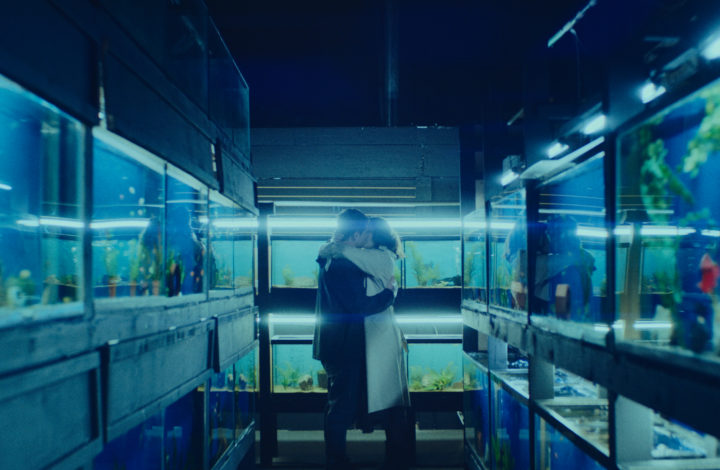
MPAA Rating: R | Rating: ★★★★
Release year: 2021
Genre: Drama, Romance, Sci-Fi Director: Chad Hartigan
Chad Hartigan’s Little Fish is, in a word, unforgettable. The dystopian tale is set within the not-so-distant future where a global pandemic has suddenly devastated the population, leaving chaos and heartache in its wake. Remarkably, Hartigan and his crew filmed Little Fish in and around Vancouver, BC in spring 2019, months before the current real-life pandemic transformed our world. This is a work of coincidence and prescience rather than reaction; its ideas and emotions are timeless, while nevertheless being timely. Indeed, our present global circumstances imbue this sci-fi romance with an unexpected urgency and pathos. What might have once seemed extreme or bizarre—face masks, social distancing, general sociopolitical chaos—now feels oddly familiar, even normal. But instead of flu or coronavirus, the virus at the heart of Little Fish affects the victims’ memories, causing gradual permanent memory loss in a manner not unlike the onset of a fast-acting Alzheimer’s. Pilots forget how to fly planes; parents forget who their children are; marathon runners forget to stop running.
While comparisons to Contagion, Memento, or Amour may come to mind, Little Fish‘s strongest parallel is perhaps Eternal Sunshine of the Spotless Mind in that both melancholic films explore the ups and downs of a particular romance through the lens of loss. The story of newlyweds Emma (Olivia Cooke) and Jude (Jack O’Connell) is told in a montage of flashbacks primarily from her perspective as she writes a heartbreaking letter to her beloved. She’s a vet, he’s a photographer; it’s the marriage of science and art, and the two have that unique romantic chemistry which is difficult to describe, but easy to identify when you see it. So when Jude begins to show early signs of NIA, or “neuroinflammatory affliction,” the pair must deal with the reality that their love may not be able to overcome this mental disability. The larger sci-fi and dystopian elements of Little Fish are often relegated to the background in order to focus on these two individuals, which is probably for the better, as it adds to the intimacy. We see Jude and Emma simply doing ordinary things—laughing at parties, hanging out with friends Ben (Raúl Castillo) and Samantha (Soko), going to work, painting their apartment together, walking their dog—which are all imbued with a sense of sacredness precisely because of their ephemerality. When every moment together will eventually be lost to time or disease, it can either lead to existential despair or a deep sense of gratitude. Little Fish explores the gradations between these two extremes, empathetically inviting the audience to experience this sense of loss. O’Connell is great as Jude, but it’s Cooke’s performance that remains more memorable to me, communicating a great range of emotion through her bright eyes and subtle gestures. Her performances in both this film and Sound of Metal are the best on-screen work she’s done to date.
The screenplay from Mattson Tomlin (who also wrote the forthcoming Robert Pattison-helmed The Batman) is an adaptation of a short story from Aja Gabel by the same name, but this is ultimately Chad Hartigan’s film, through and through. His 2013 film This Is Martin Bonner is certainly one of the best films of 2010s, and his 2016 follow-up, Morris From America, is likewise an affecting work of cinematic art. Formally and tonally, these three films are quite distinct, and one could not be faulted for believing they were each directed by different filmmakers. Yet I discern a thematic consistency between them: they are each utilizing the cinematic apparatus to explore the rich complexities of human emotions within individuals undergoing ordinary-yet-extraordinary experiences after experiencing a tragic relational loss. That is, each of the central characters in these films must face an external circumstance that feels wildly out of control, and Hartigan is interested in guiding us toward empathetically understanding each of their internal journeys. These are humble, tender films which are as profound as they are unassuming. Even if I eventually fail to recall the minor narrative details of Little Fish, I won’t soon forget how powerfully the film made me feel. In our present era where the experience of loss is always on the horizon, Little Fish is a powerfully poignant cinematic balm for the soul.
IMDB Listing: https://www.imdb.com/title/tt9735470/
Leave a Reply